SUMMARY: Effective Mosquitoes Control is crucial for public health.
Implementing effective Mosquitoes Control measures is essential for safeguarding public health.
- Mosquitoes, especially Aedes species like Aedes aegypti and Aedes albopictus, transmit deadly diseases such as dengue fever, Zika virus, and malaria.
- Dengue cases in Malaysia have been increasing annually, with significant rises in reported cases and deaths.
- Aedes mosquitoes breed in stagnant water and thrive in urban areas close to human habitation.
- Home mosquito control measures include removing stagnant water sources like flower pots, bird baths, and containers.
- Professional mosquito control involves strategies like source reduction, larvicides, insecticide spraying, and public education.
- Combating mosquitoes and the diseases they transmit requires individual efforts, professional intervention, and community awareness and participation.
INTRODUCTION
Many consider it a fact that mosquitoes are the deadliest creatures on Earth. Although they don’t directly cause fatalities through their bites, mosquitoes serve as vectors for numerous deadly diseases. The illnesses they transmit, including malaria, dengue fever, Zika virus, and more, contribute to a significant number of human deaths annually. In Malaysia, dengue cases show a consistent upward trend each year. In 2022, Malaysia recorded 66,102 cases of dengue, resulting in 56 deaths, compared to 26,365 cases and 20 deaths in the previous year, 2021. The figures escalated further in 2023, with reported cases reaching 123,133 and 100 deaths, marking an increase of 86.3 percent from the previous year.
WHO IS AEDES MOSQUITOES?
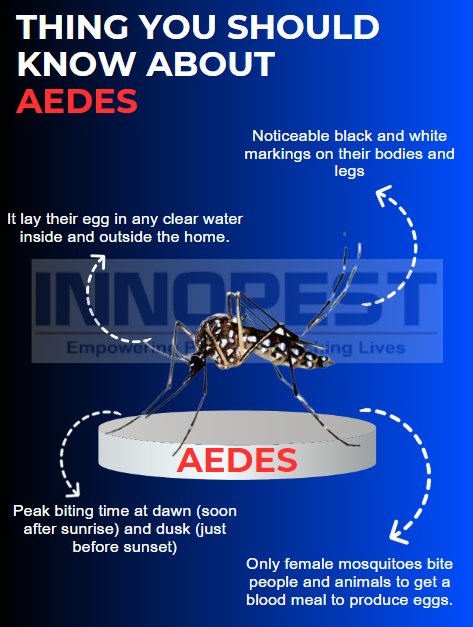
The Aedes aegypti mosquito is the main species responsible for transmitting the dengue virus. Another mosquito species, Aedes albopictus, is also capable of transmitting the virus. They transmit the dengue virus when they bite an infected person, picking up the virus. After the virus multiplies in the mosquito, it can be transmitted to a new person through the mosquito’s bite. They are commonly found in urban and suburban areas, thriving in close proximity to human habitation. Aedes aegypti mosquitoes live indoors and outdoors whereas Aedes albopictus live outdoors.
AEDES MOSQUITOES’ LIFE CYCLE
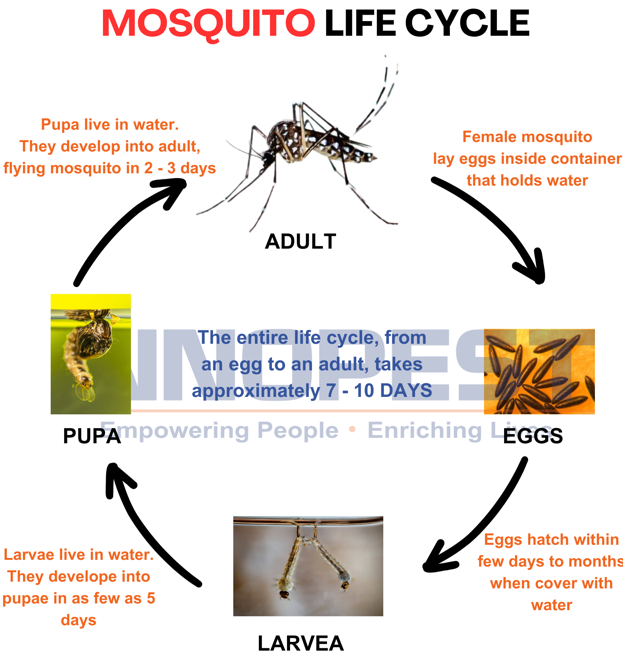
Understanding the importance of Mosquitoes Control can lead to proactive measures in communities.
Aedes mosquitoes undergo complete metamorphosis, consisting of four stages: egg, larva, pupa, and adult. The larvae and pupae develop in standing water. Adult mosquitoes live for about 2 to 4 weeks depending on the species, humidity, temperature, and other factors. Female mosquitoes often live longer than male mosquitoes. The interesting fact is only female mosquito bite human and animal whereas male mosquitoes primarily feed on nectar and plant juices.
AEDES MOSQUITO CONTROL AT HOME
To prevent dengue, it is essential to protect ourselves from mosquito bites. Here are a few measures to avoid being bitten by mosquitoes:
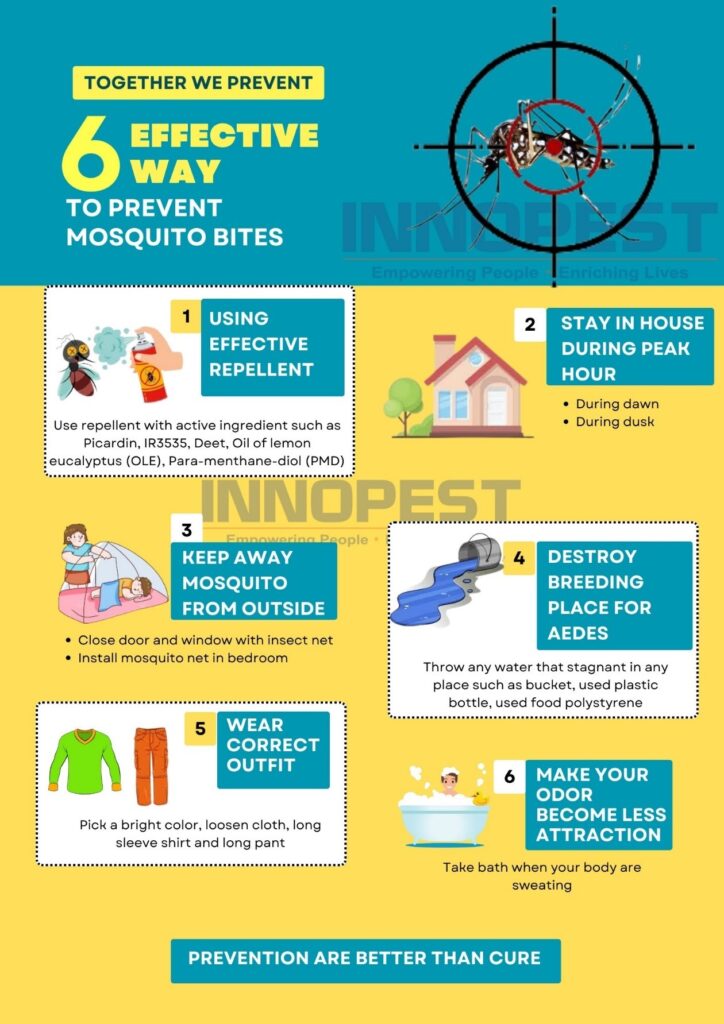
Aedes mosquitoes reproduce in stagnant water, so it is important to remove any standing water in your vicinity. Inspect and drain water from items like flower pots, bird baths, buckets, clogged gutters, and discarded tires. Additionally, if you have water storage containers, make sure they are securely covered to deter mosquitoes from laying eggs. Routinely clean and scrub these containers to eliminate any mosquito eggs or larvae.
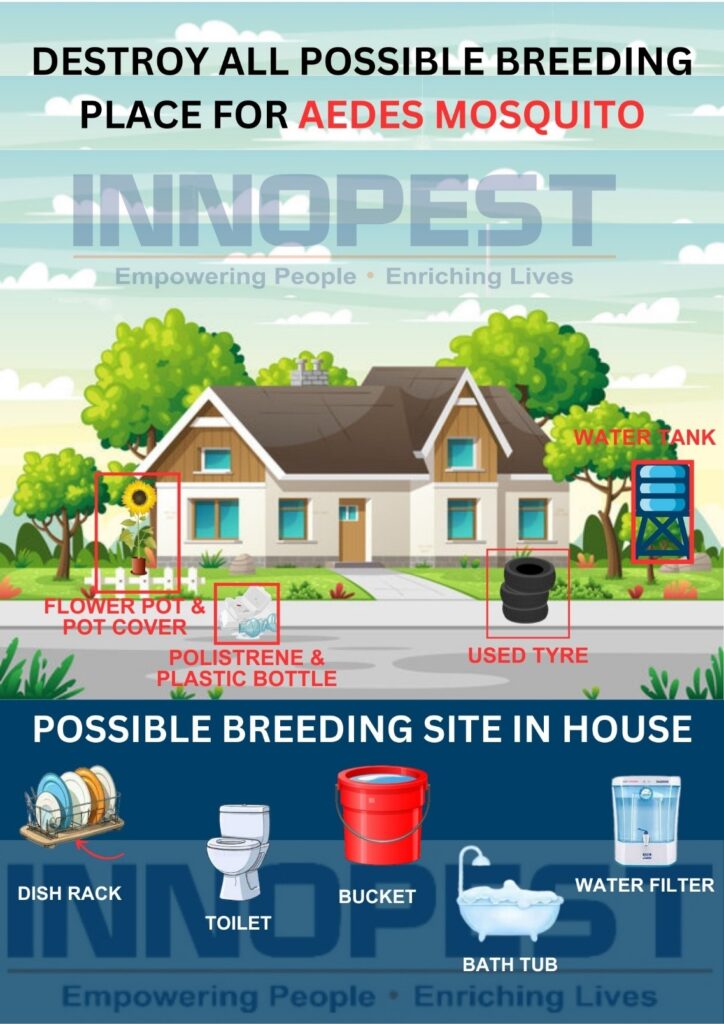
Effective Mosquitoes Control starts with eliminating potential breeding grounds.
AEDES MOSQUITO CONTROL BY PROFESSIONAL
Understanding Mosquitoes Control
In addition to personal efforts, municipal programs for Mosquitoes Control are crucial.
Professional mosquito control aims to reduce mosquito populations and minimize the risk of mosquito-borne diseases in a targeted and effective manner. Professionals use strategies to control mosquitoes by understanding how they live, reproduce, and spread diseases. When these methods are applied correctly, they are safe and have been proven scientifically to reduce the number of mosquitoes around. Below are several prevalent techniques employed by professionals in the field of mosquito control:
Relying solely on professionals is not enough; every individual can contribute to Mosquitoes Control.
Collaboration between residents and professionals enhances the effectiveness of Mosquitoes Control.
Long-term success in Mosquitoes Control requires community education and participation.
Mosquitoes Control Strategies
- Inspection and Monitoring: Consistent observation of mosquito populations is conducted to identify their species, quantity, and potential breeding locations. This monitoring aids in making well-informed decisions regarding control measures.
- Mosquito Control by Source Reduction: Professionals may identify and eliminate or treat mosquito breeding sites, such as stagnant water in containers, gutters, and other areas where water accumulates.
- Mosquito Control for Larvae and Pupae: Larvicides are chemicals designed to kill mosquito larvae before they mature into adult mosquitoes. Professionals may apply larvicides to standing water sources where mosquitoes breed.
- Mosquito Control for Adult Mosquito: Professionals may use insecticides to spray areas with a high mosquito population. This could include outdoor spaces, vegetation, and breeding sites. Ultra-low volume (ULV) and thermal fogging machines may be employed to disperse insecticides in fine droplets, targeting adult mosquitoes.
- Public Education and Outreach: Informing and educating the public about mosquito biology, disease transmission, and effective preventive measures. This includes promoting community participation in mosquito control efforts.
CONCLUSION
In summary, effective Mosquitoes Control not only protects individual health but also benefits the community as a whole.
To wrap it up, keeping mosquitoes in check involves watching them regularly, using specific methods, and getting everyone in the community involved. By knowing how mosquitoes live and using proven ways to control them, experts can make sure there are fewer mosquitoes and fewer diseases. It’s important that everyone stays aware and helps out to keep these efforts going strong.
If you need additional details about how Innopest can assist in mosquito control at your location or home, please visit us at https://innopest.my/mosquitoes-control/ for more information.

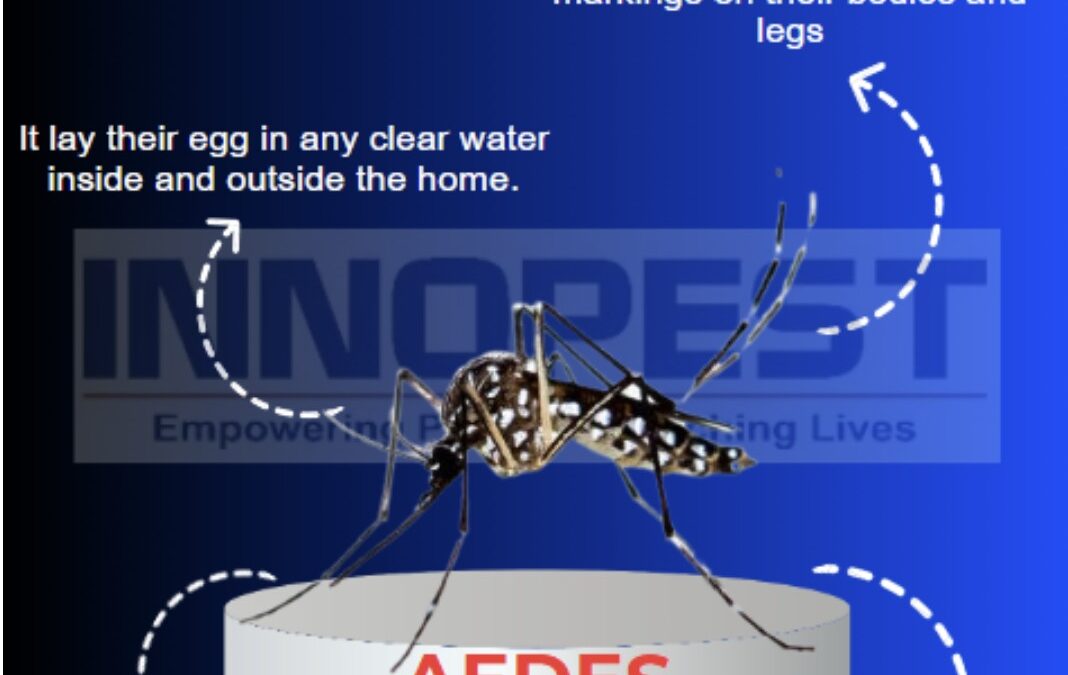
Recent Comments